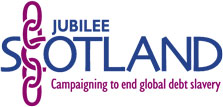|
|
G8 Watch
WHAT IS THE STATE OF DEBT IN THE WORLD?
WHAT DID THE G8 PROPOSE TO DO ABOUT IT?
The sixty countries in the world with the
worst conditions for their citizens collectively owe the richest
nations about $240 billion. They spend about $8 billion a year repaying
these loans and the interest on them.
Why should this debt be thought bad? After all, the United States
alone has bigger debts than this!
There
are three sets of reasons why it can be argued to be a problem:
1. Money
2. Power
3. Justice
And here's
what the G8 debt deal did to address these three problems:
The G8 and the Money
Problem
The
G8 and the Power Problem
The
G8 and the Justice Problem
1.
Money
The repayments on the debt leave governments without enough money
to
fund their health and education services or develop their country.
Also, debt
payments are normally made in dollars, so countries have to focus
their economies
on producing raw materials for dollar-generating exports. This causes
pollution
and can make it hard for countries to feed their own people as cash
crops or mineral extraction take priority over local food production.
High debt service also drives away private investors, who do not
want to see their investments paid back out again as debt service.
2. Power
Debt cancellation is provided by the G8 (see Jargon Watch, below)
and the huge
international financial institutions that the G8 effectively controls
(the World
Bank and International Monetary Fund (IMF). Debt provides a way
for the G8 to
have power over the economic policies of indebted countries. Debt
and debt relief
act as both stick and carrot in the process persuading developing
countries to run
their economies in the way that the IMF and World Bank think is
best. The poorest
people in developing countries may have very different ideas about
how to
develop, but these ideas are not heard.
3. Justice
Many of the debts are the legacy of a history of domination, rooted
in the time
of colonialism. The world's most impoverished countries have become
indebted through, for example, the need for reconstruction after
independence or
anti-apartheid struggles; from underhand commercial lending practices;
from rises
in interest rates designed to fend off recession in the US at the
expense of
others; and from strategic loans made to dictators during the Cold
War. The debts
of old dictators have weighed heavily on the new African democracies.
Many of the debts are unjust, and so justice calls for them to be
cancelled; but some people go further and argue that the true debt,
the moral debt, is owed from Western countries to the countries
that used to be colonies. What the G8 proposed In brief, the G8
debt cancellation proposals meet about a tenth of the
money problems, make the political issues worse, and entirely ignore
the history of
injustice.
The G8 and the
Money Problem
The G8 proposed that all debts owed to the World Bank, African Development
Fund (AfDF) and IMF should be cancelled for a select group of eighteen
countries. Twenty more countries are likely to qualify for the same
cancellation in the near future and more may qualify at some point.
The countries would stop making any payments on their debts as soon
as the deal is implemented. This debt cancellation would cost the
World Bank and IMF $17bn. On the surface, this looks like a big
saving for the eighteen countries that qualify:nearly half (48%)
of their debts are owed to the World Bank, IMF and AfDF: so the
deal should reduce their total debts by nearly half. However, the
real benefit will be much lower than this, as the World Bank will
offset the cost of debt cancellation by reducing the aid that it
currently gives to the eligible countries by about two-thirds. Jubilee
Scotland calculates that the average gain to the countries that
qualify for the G8 deal will be just over a quarter of the value
of their total external debt. So, in rough summary, the G8 debt
deal will provide for the cancellation of under a third of the debts
of under a third of the countries that need it. For some countries,
this will make a big difference to the problem of money, but it
is still about a tenth of what is needed overall.
The G8 and the Power Problem
The deal is only available to countries that have already persuaded
the IMF to give them debt relief, and so far eighteen countries
have managed to persuade it. If a country wants to persuade the
IMF to give it debt relief, it has to "adopt and pursue strong
programmes of adjustment and reform" (IMF website). That is,
it must show that it is running its economy in the way that the
IMF likes. This involves setting up free markets, bringing the private
sector into providing services, keeping government expenditure low
while raising the government income from taxes. These policies may
be fine in the right context. However, after twenty years of applying
them in Africa, the situation has become catastrophic. The IMF thinks
it has hit on the best way to promote growth and reduce poverty;
the evidence shows that it is wrong. The debt cancellation is only
available to countries which have already persuaded the IMF to give
them debt relief, That is, it is only available to countries which
have already made a good start in putting the IMF's economic policies
in place. So the G8 deal makes the problem of power worse. By strengthening
the gains to be had from satisfying the IMF, the G8's debt deal
strengthens the IMF's potential for control.
The G8 and the
Justice Problem
Nothing in the G8 deal seems to address the problem of justice.
Countries that
want debt relief have to persuade the IMF to give it to them, rather
than debts
being cancelled as a matter of what is right.
Last summary
In brief: the G8 debt deal solves about a tenth of the money problem,
makes the
power problem worse, and is silent on matter of justice. This does
not mean
that the G8 Summit was a failure, though. Compared to what G8 summits
normally
yield, the debt deal is a great achievement. But it's easy to imagine
a far better debt deal: debt cancellation could just be provided
for all sixty countries without any economic policy conditions attached.
Jargon Watch:
The process of persuading the IMF to give it debt
relief is called the Heavily Indebted Poor Country
initiative (HIPC).
The G8 is the group of the world's richest and most
powerful countries: USA, Germany, UK, France,
Italy, Japan, Canada, Russia.
The G8 Debt Deal is now known as the Multilateral
Debt Relief Initiative (MDRI).
click here to go find
out more about the facts behind the G8 debt deal
Download
the NGO Assesment of the G8 Debt Deal 
back to
top >>
|

